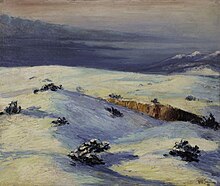Will Shuster
Will Shuster | |
|---|---|
| Born | William Howard Shuster Jr. November 26, 1893 Philadelphia, Pennsylvania, U.S. |
| Died | February 9, 1969 (aged 75) Albuquerque, New Mexico, U.S. |
| Resting place | Santa Fe National Cemetery Santa Fe, New Mexico, U.S. |
| Education | John Sloan |
| Alma mater | Drexel Institute |
| Known for | Painting |
| Notable work | Zozobra |
| Movement | Los Cinco Pintores |
William Howard Shuster Jr. (1893–1969) was an American painter, sculptor and teacher.
Youth
[edit]
Shuster was born November 26, 1893, in Philadelphia, Pennsylvania, as the second of three children.[1]
He served in the U.S. Army during World War I in France, where he developed tuberculosis after being gassed.[2] He would receive a disability pension thereafter.
New Mexico
[edit]
In 1920, Shuster moved to New Mexico[3] to improve his health and became friends with the small but growing arts community. Shuster made money doing ironwork and painting to supplement the pension.[4] In 1921, he became a member of Los Cinco Pintores ("the five painters"), and showed throughout Santa Fe and the rest of the country with the group.
Oeuvre
[edit]
His artwork is in the permanent collections of the Stark Museum of Art, Brooklyn Museum, Delaware Art Museum, Newark Museum, and New Mexico Museum of Art.[5]
- undated — Senator Bronson Cutting (bronze bust)
- undated — Avanyu 1
- undated — Avanyu 2
- undated — Prayer for the Hunt
- undated — Portrait of Teresa Bakos
- undated — 40th Wedding Anniversary
- 1921 — New Mexico Snow Country
- October 1922 — The Eve of Saint Francis
- 1924 — Zozobra, a giant puppet now burned every year in effigy, and symbolizing the gloom of the passing year.
- 1927 — New Mexico Mountain Scene
- 1928 — Portrait of John Sloan
- 1929 —The Santo Domingo - Corn Dance
- c. 1930 — Trees at Canyoncito
- c. 1934 — Eagle Dancer (study for The Voice of the Sky)
- 1934 — Winnowing Wheat
- May 28 - August 8, 1934 — The Voice of the Earth (The Basket Dance)
- 1934 — Pottery Maker
- May 28 - August 28, 1934 — The Voice of the Water (The Spring Flute Ceremony)
- 1934 — Sermon at Cross of the Martyrs
- 1935 — The Voice of Sipapu (The Kiva)
- c. 1940 — Sketchbook
- September 14 - October 12, 1943 — The Voice of the Sky (The Eagle Dance)
- 1949 — Untitled (Deer Dance)[6]
- 1952 — El Toro, a symbol for the Santa Fe Rodeo.
- 1964 — Zozobra Mural
Notes and references
[edit]- ^ John Sloan ~ Will Shuster: A Santa Fe Friendship. Santa Fe, NM: The Peters Corporation. 1993. ISBN 0935037497.
- ^ Dispenza, Joseph & Louise Turner (1989). Will Shuster: A Santa Fe Legend. Santa Fe, NM: Museum of New Mexico Press. ISBN 0890131988.
- ^ "Oral history interview with Will Shuster". Archives of American Art, Smithsonian Institution. Retrieved 16 January 2014.
- ^ Robertson, Edna (1975). Los Cinco Pintores. Santa Fe: Museum of New Mexico Press. ISBN 0890130809.
- ^ Lewandowski, Stacia (2011). Light, Landscape and the Creative Quest : Early Artists of Santa Fe. New Mexico: Salska Arts. p. 144. ISBN 9780615469171.
- ^ "Untitled (Deer Dance)". 1949.
